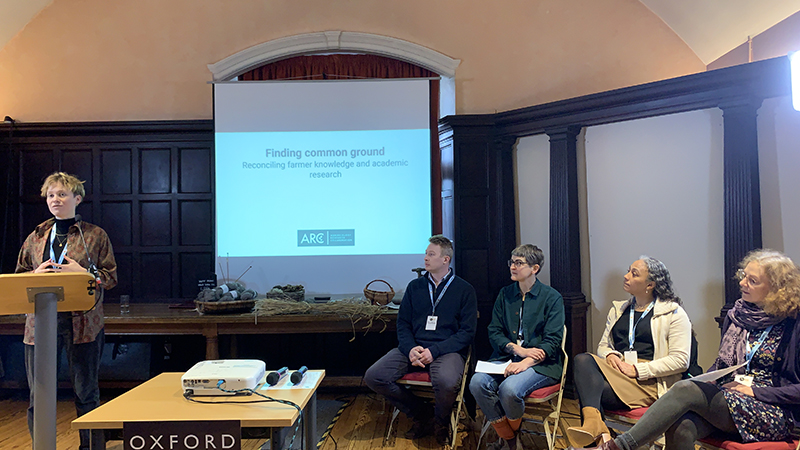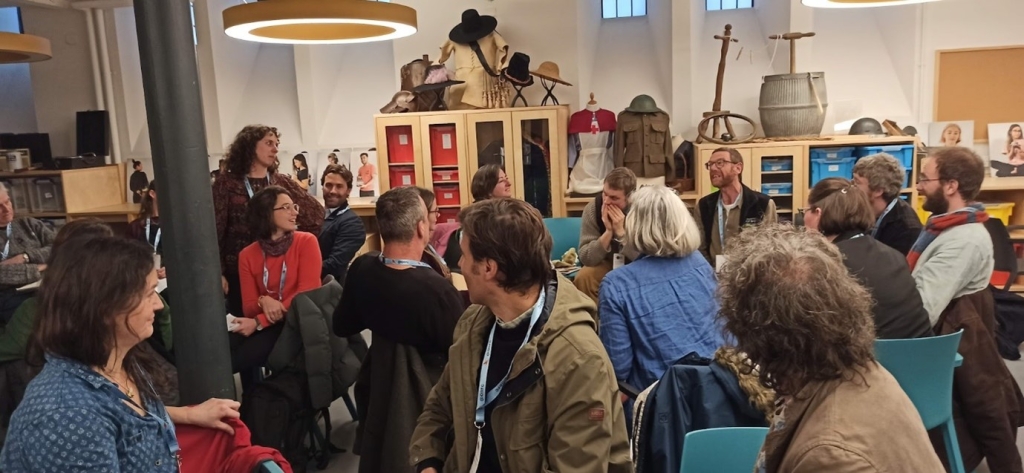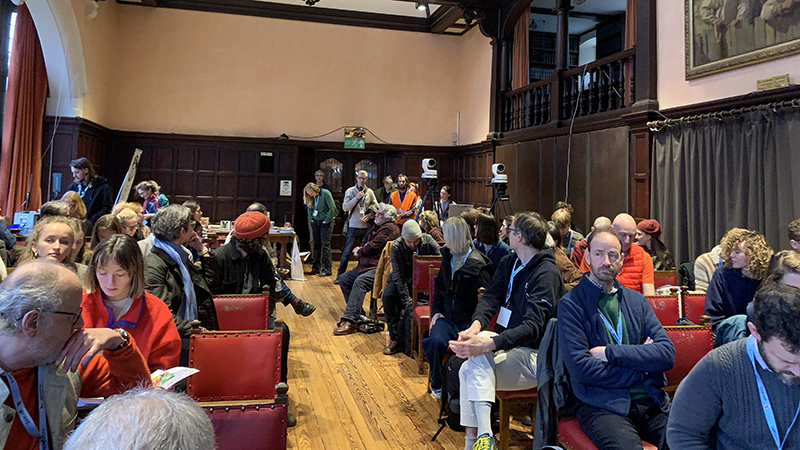ORC’s Head of Research Julia Cooper blogs on the recent Oxford Real Farming Conference.

My husband is a Muslim and every year during Ramadan he reminds me that the holy month is essentially ‘boot camp for Muslims.’ For that one month Muslims focus on the core elements of their faith and build spiritual resilience and strength in preparation for the year ahead. The Oxford Real Farming Conference could be described in a similar way: bootcamp for agroecologists. We gather in a community of shared values to focus on the core elements of agroecology; we meet people, share food, connect and build our strength and resilience to do our work in the year ahead.
I couldn’t have thought of a better way for me to begin my agroecology bootcamp than in the first session I attended, hosted by the indomitable Jyoti Fernandes of the Landworkers’ Alliance. We were meeting to discuss Agrobiodiversity for the Survival of our Food System, but the slight technical delay at the beginning left Jyoti in charge of keeping the audience amused. Undaunted, she launched into a beautiful solo rendition of “We Shall be Known” with the refrain “It is time now….in this great turning we shall learn to lead in love” and had us all singing in unison within minutes. Singing together is one of those transcendent experiences that connects us to each other and (if we’re lucky) some higher power. It was a perfect start to a session where we went on to learn about the shocking lack of diversity in seed varieties traded globally, and the amazing work being done on the ground by people like Richie Walsh, Hannah Thorogood, Tom Adams and Henrietta Inman, to create alternative ways of farming that integrate diversity into their farming and food systems.
I hadn’t planned to take in any sessions in the Main Hall, preferring to go to some of the more intimate, interactive workshops. But I was intrigued to hear what Chris Smaje would have to say in the Friday session on the Role of Agroecological Farming in the Transition to Net Zero: I had read his book (Saying No to a Farm Free Future) and wanted to hear more. Who knew that the session would be stolen by a Tory peer from Suffolk? Lord Deben, former Chair of the Climate Change Committee, was spot on with all his comments on localism, Brexit and the current government! And he left me with this simple mnemonic that I’ve been repeating to anyone who has been unfortunate enough to be trapped in conversation with me since Oxford. If you want to remember which four mega-companies control our global food system, then just think ABCD. That’s for Archer Daniels Midland, Bunge, Cargill and Louis Dreyfuss. Together these companies control 75% of the global grain trade; primarily promoting industrially produced wheat, maize and soy. I’ve started asking myself whenever I am about to buy food – how much of this money is going to trickle back to one of these big four? It’s nigh on impossible to completely exclude purchasing that flows back to the ABCD group (remember they control most of the major seed companies and animal genetics too) but at least we can try to minimise this flow through buying unprocessed food from local producers who use heterogenous seed sources.

The ABCD revelation made the workshop run by the UK Grain Lab and our own Charlotte Bickler even more relevant. No risk of death by powerpoint in this session; we were assigned to different roles and tasked with getting to work reimagining a new cereal seed system. Farmers needed to be paid a fair price for their grain but supermarkets were selling loaves at a cut price; squeezing the bakers, the millers and the traders, all the way back to the farmers. If supermarkets sold their loaves of bread for a higher price, how would that affect the already cash-strapped consumer? I am not sure we came up with a solution to this challenge, but it certainly drove home the complexities we face when trying to design an equitable, fair and sustainable food system. Listen to the workshop on Soundcloud
My own part in the conference was as a panelist on the discussion hosted by the Agroecology Research Collaboration: The Search for Common Ground: Reconciling Farming and Academic Research. Chaired very ably by Tara Wight we all had a few minutes to introduce ourselves and our perspective on research and farmer participation. Ben Adams, an active farmer/experimenter reminded us that he has no time or interest in reading academic papers; seeing is believing and he has effectively tested and demonstrated lots of innovative practices on his own farm. Holly Silvester of Trill Farm Garden also works for the Gaia Foundation Seed Sovereignty programme and inspired us with her story of self-education through non-formal routes into seed genetic diversity and the soil microbiome, satisfying her “relentless interest in soils”. Angelina Sanderson Bellamy, Professor of Food Systems at the University of Western England Bristol, impressed us with her story; a rapid rise up the academic ladder, securing big budget research projects from UKRI, while staying true to her values and working with local food producers on the ground. She was a hard act to follow! My intro was more of a confessional, reflecting on many years of working in soil management from Asia to Canada to the UK in a very ‘conventional’ way; often working directly with farmers but too often constrained by funding sources and academic systems into a top-down approach. I’m all too aware that when we conduct research on farms, we can easily become a burden on the very people we are aiming to help. During the discussion session I put one of ORC’s key on-farm research partners, Mark Lea, on the spot by asking him what he got out of all the research on his farm. I really appreciated his candour when he replied “…there is a limit to how much we can give…and it is an issue…”. Making sure the research questions we are answering are the ones that are really of interest to farmers, and adequately compensating them for their time, was a key message I took from the session.

Now back home in the north of England I’ve been trying to maintain that bootcamp energy in my work and life in my community. Remembering my ABCs of corporate control…building relationships with local grower groups…buying my bread from the local artisan bakery…all the time with that refrain humming in my head…
It is time now
It is time now that we thrive
It is time we lead ourselves into the well
It is time now, and what a time to be alive
In this great turning we shall learn to lead in love
In this great turning we shall learn to lead in love
See the complete playlist from the Oxford Real Farming Conference 2024 here
